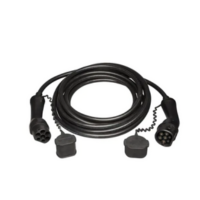Electric vehicles plug and charging station
Choose the most suitable charging station for your electric vehicle to take full advantage of it on a daily basis.…
Our brands
Discover our brands
Socket and charging station: which model to choose?
However, it is not always easy to choose the right model among all the offers that are presented on the market. That's why One-Elec.com recommends a selection of sockets and charging stations for electric vehicles and plug-in hybrids. In addition, and in order to guarantee the safe use of your charging devices, you will also find the appropriate accessories on our online store: charging cable, differential circuit breaker and lightning arrester.
We have prioritised the quality, robustness, and performance of the selected equipment by trusting renowned electrical equipment manufacturers. Find the EVlink Wallbox from Schneider Electric, the Green'up sockets and charging stations from Legrand, the Hager and ABB brands.
Socket and charging station: which model to choose?
In addition, and in order to guarantee the safe use of your charging devices, you will also find the appropriate accessories on our online store: charging cable, differential circuit breaker and lightning arrester. We have prioritised the quality, robustness, and performance of the selected equipment by trusting renowned electrical equipment manufacturers. Find the EVlink Wallbox from Schneider Electric, the Green'up sockets and charging stations from Legrand, the Hager and ABB brands.
A variable charging power depending on the type of electric vehicle
The charging power is the first differentiating element to consider when you want to invest in a charging solution for an electric vehicle. This choice criterion will depend on the type of vehicle you own, and consequently on the load power that it will be able to withstand. Take, for example, plug-in hybrid vehicles that combine a thermal and electric motorization. The latter are equipped with a large capacity rechargeable battery. However, the maximum load accepted by this model of cars is 3kW, regardless of the power of the terminal. Other 100% electric vehicles, for their part, will be able to accept a maximum recharging power of 7 kW in single-phase 32A (most homes have a single-phase network). So there is no need to praise a fast and expensive charging station (11 kW and 22 kW in three-phase network) if your vehicle is limited by its carrying capacity. The nominal power of a home charging station or wallbox varies from 2.3 kW to 22 kW on average. The greater the power of the device, the shorter the time required to recharge the vehicle. But the cost of such a benefit is… its price.
Indeed, the latter will be proportional to the power of the electrical terminal. A charging station for an electric car with a significant power will offer a fast-charging time. It will therefore naturally be more expensive. As you can see, the charging power accepted by your vehicle depends on its model. You’ll have to consider this characteristic before making your choice among the available charging solutions.
The mileage travelled with your electric vehicle: an important parameter
When you are about to install a charging station in the parking lot of your company, or at the home of your main residence, it is advisable to integrate a second parameter: the daily use of the vehicle. The number of kms travelled each day will also be decisive in the choice of the model of electric terminal or Wallbox to be installed. This information allows you to evaluate the frequency of recharges necessary to ensure your trips with complete serenity. As a result, it is up to you to carefully evaluate the vehicle's autonomy and mileage ratio so as not to invest in a too high-performance wallbox, or conversely insufficient in terms of power.
The charging socket for electric car and plug-in hybrid
If your choice is influenced by your budget, another solution is available to you: the electric car charging socket. The charm of this socket is undoubtedly its selling price. It turns out to be much lower than that of a terminal. On the other hand, this charging device has a limited power and a more or less slow charge depending on the type of socket.
Take, for example, the slow-charging household socket. It is the most widespread model in the homes of individuals and at the level of public charging infrastructures. With this socket, the time required to fully charge a vehicle's battery is 12 hours (assuming that it is completely discharged). Another example, the reinforced "Green 'up Access" type 2 socket marketed by the French manufacturer Legrand has a power of 3.7 kW. The time required to fully charge the battery will be 8 hours.
All you have to do is make your choice between a charging station for electric vehicles and plug-in hybrids, or a charging socket for an electric car. Have a question? Don’t hesitate to contact us for personalised advice.







